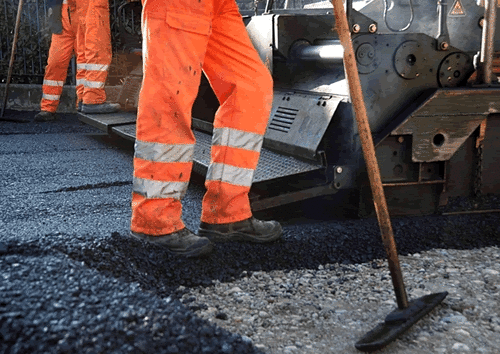End Point Assessment

Road Surfacing Operative
- Reference Code: ST0693
- Level: 2
- Version: 1.1
- Duration: 15 months
Introduction
Road Surfacing Operative (RSO) is a multi-disciplined role critical to the country’s infrastructure. RSOs are responsible for the surfacing, resurfacing and improvement of vast stretches of the public and privately owned highway network, covering all road types from motorways to residential streets. Operatives work in a wide range of different environments and will spend the majority of time outside.
Occupational role
Typical duties include: the operation of a wide range of specialist plant machinery such as planers, asphalt pavers, emulsified bitumen sprayers and compacting rollers; the removal of old/existing surfaces using a mechanical breakup process; the visual inspection and preparation of the underlying surface to receive new surfacing material; the resurfacing of the prepared area using a range of road surfacing machinery often covering vast areas; the alignment and then compaction of the new surface; and the visual inspection and testing of the new surface to ensure full compliance with the specified design. RSOs will work as part of a team, known as a gang, and will perform multiple roles within the gang including machine driver, machine operator, roller driver, rake hand, planer driver, and planer operator.
Funding
Maximum £14,000
Entry requirements
Employers will set their own entry requirements.
Content
The apprenticeship includes core skills, knowledge, and behaviours required by Road Surfacing Operatives.
End Point Assessment
Overview of assessment
The end point assessment covers all of the skills, knowledge and behaviours in the Standard. It will take place using independent assessors appointed by QFI and the methods shown below:
Workplace Observation
The apprentice will be observed, by an assessor under typical working conditions, acting as a member of a team or gang removing an old road surface and laying and compacting a new road surface. As part of this process the apprentice is required to demonstrate use of plant machinery, selected by the assessor. Following the assessment, the assessor will ask a minimum of 8 open questions to assess background knowledge relating to the tasks carried out, with an emphasis on health and safety and associated regulations. The workplace observation will take place over 6 hours.
Professional Discussion
Conducted on a 1:1 basis, the competency-based professional discussion consists of 10 standardised questions, with follow-up questions to probe further if required or to seek clarification. The discussion is based on the apprentice’s portfolio of evidence as well as the knowledge, skills and behaviour requirements as part of the road surfacing operative standard.
The professional discussion will last for 1 hour and may be conducted face-to-face or via video conferencing and will be recorded. The apprentice can use their portfolio to support the discussion, though the portfolio itself assessed will not be directly assessed.
Readiness for assessment
The employer will endorse progression to the end-point when satisfied that the apprentice is consistently working at or above the level set out in the standard, and the pre-requisite gateway requirements have been met with evidence to support these:
- achieved minimum level 1 English and mathematics
- completed a portfolio of evidence - to support the professional discussion
Grading
This apprenticeship is graded by the independent assessor appointed by QFI and grades are either: fail, pass or distinction.
Professional Recognition
N/A
Why choose QFI
QFI is listed on the Register of Apprenticeship Assessment Organisations to assess this apprenticeship Standard. We have access to specialist, occupationally competent independent assessors. We will work with you to ensure that the end-point assessment runs as smoothly as possible providing support for any staff involved in the process. Contact us now to discuss your requirements leadassessor@qfiepa.org









